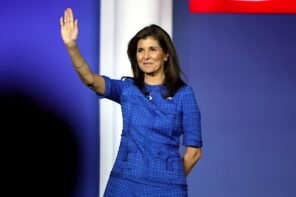Last week saw another clash about women’s (in)equality play out online between leaders in evangelical Christian culture. In the clamor for the high-ground of evangelical legitimacy, something happened that outsiders may not fully appreciate the implications of: the participants contested each others’ commitment to the inerrancy of the Bible.
Evangelicals who identify as inerrantists consider their Bible to be without error in all of its correctly interpreted, actual claims. Think about how often evangelicals talk about their Bible’s reliability, truthfulness, or authority. Inerrancy is the concept their leaders use to legitimate such talk. Unity in these concerns, however, does not yield unity in the interpretation of the Bible or even in how to understand the nature of truth and inerrancy. Inerrancy itself is a contested, polemical landscape.
One of the notable books in the social history of biblical inerrancy was Harold Lindsell’s Battle for the Bible, published in 1976. It quickly became a lightning rod inside the white evangelical world, attracting parades of praise and criticism. For Lindsell, inerrancy was a “watershed.” Any wavering in commitment to the Christian Bible’s lack-of-error leads to catastrophic decline in doctrine and morality. And Lindsell named names!
Despite the nearly half century that’s passed since its publication, Battle for the Bible illustrates the politics of inerrancy on display last week: the doctrine functions as a tool for discrediting evangelical competitors. But the book also exemplifies an often invisible, or erased, gender and racial contour to the politics of inerrancy. It shows, in other words, how inerrancy services white masculine authority.
Let’s un-erase this facet of inerrancy’s politics. At one point, Lindsell lauds the (white) Christians “south of the Mason-Dixon line” since “probably no other geographical region in the United States has had a better record for belief in the infallibility of the Word of God.” He wrote these words in the early 1970s about the very Christians who had upheld a brutal apartheid state, downplayed Jim Crow’s violence and exploitation, and reserved their harshest vitriol for the activists and Federal Government who sought to end it.
Lindsell would know. He became editor of Christianity Today toward the end of the Civil Rights era. As Dr. Curtis Evans shows, the magazine reserved its harshest criticism for integrationists. It also decried interracial marriage and promoted “voluntary integration”—what Dr. King called the “White Moderate” position that sought to delay justice for Black people until white feelings catch up (still waiting). When Lindsell treats “Ethical and Moral” issues, it’s the history of “ethical deceit and moral failure” of Christians who were not forthright about rejecting inerrancy. Complicity in a long White Supremacist regime of exploitation, subjugation, and terror does not register.
To focus on Lindsell’s silence about the White Supremacy of Southern upholders of biblical infallibility isn’t some woke tantrum. It’s a crucial part of thinking critically about the history of inerrancy. Jim Crow-era white Christians overwhelmingly advocated for and identified with the vicious racial caste system from which they benefitted.
And as Carolyn Renée Dupont and J. Russell Hawkins demonstrate, they did so in the name of biblical authority. Segregationist Christians made their preferred racial-economic hierarchy seem natural by presenting it as biblical, and they maligned anti-segregation Christians by critiquing their biblical exegesis and questioning their commitment to Christian truth. E. Earle Ellis, a New Testament professor and founder of the Institute for Biblical Research, provides a perfect example in his 1957 Christianity Today article, “Segregation and the Kingdom of God.” It contests Christian “integrationists” by labeling them “Secular,” asserting that they have their “roots in a secular view of the Kingdom of God,” and associating them with “Christian communism” as opposed to biblical truth.
Similarly, in early 1960s Baptist debates about Furman University, Eric Hardy decried desegregating the school as “un-Christian and basically atheistic,” with Winfield Martins adding: “it is much more popular to please man than to please God, to ‘conform’ rather than ‘be transformed.’” Such rhetoric reflects the pre-history, traced by historian Molly Worthen, of the budding polemics about inerrancy and “biblical worldviews” versus “secular humanism” that we still see to this day. This became a dichotomy among evangelicals for marginalizing competitors.
It’s important not to accept White Supremacy as a default and act like only the Civil Rights activists were activists. White conservative Christians were likewise racial activists, and biblical infallibility was there on the front lines with them. It did important rhetorical work: erasing their complicity in a brutal regime while transforming them into ‘just faithful Christians speaking hard truths about the Bible’ against Christians who failed to uphold its authority.
In her important book, If God Still Breathes, Why Can’t I: Black Lives Matter and Biblical Authority, Dr. Angela Parker explains that evangelical doctrines of scripture thus serve “as tools of White supremacist thought that promote the erasure of communal memory” of racial subjugation. And among the “evangelical doctrines of scripture” Dr. Parker refers to, inerrancy plays a prominent role.
‘Jim Crow patriarchy’
Patriarchy is a related arena of inerrancy’s activism, which makes sense since historians of America have long pointed out that White Supremacy was about reproducing hierarchies with white men at the top. This brings us to the story of inerrancy unfolding right now that captures my interest as a scholar who focuses on the gendered politics of how evangelicals talk about their Bible.
In recent weeks there’s been an unfolding brouhaha between “Complementarian” and “Egalitarian” evangelicals. Complementarian is the self-designation of evangelicals who deny women the right to be ministers and hold other positions of authority—especially over men. They eschew the more accurate terminology of sexism, misogyny, and (sometimes) patriarchy, holding that God ordained separate hierarchical roles in church and the home for men over women but created men and women “equal before God.” For the record, I call this Jim Crow Patriarchy: Separate (roles) but Equal (worth). Egalitarians are, often heteronormative, evangelicals who promote some equal-access of women to roles of authority in settings where those roles are denied by complementarians.
The current eruption centers around complementarian mobilization to discredit recent books that have made more evangelicals suspicious of patriarchy. The first is Kristin Kobes Du Mez’s Jesus and John Wayne, a work of US religious history that argues the reproduction of white masculine authority and the erasure of its abuses is a core characteristic of evangelicalism’s history, not a Trumpian aberration. The other is Beth Allison Barr’s The Making of Biblical Womanhood. While Barr’s book is a work of history by a Medievalist, it’s also an evangelical egalitarian theological argument that advances normative claims.
Given that Barr’s book contributes to evangelical productions of masculinity and femininity, complementarian leaders understandably felt compelled to respond. For an example of the flavor of these responses, pastor and theologian Kevin De Young wrote a detailed review for The Gospel Coalition. His review trickled down, if you will, into approving and critical responses in the evangelical blogosphere and social media ether—including from Barr herself.
In a predictable move, polemics about Barr eventually turned to contesting who was truly an inerrantist. Thus the president of the complementarian Council on Biblical Manhood and Womanhood, Denny Burk, wrote a piece that approvingly quoted other complementarian leaders who associate evangelical egalitarians with denials of biblical authority.
For example, Ligon Duncan:
“The denial of complementarianism undermines the church’s practical embrace of the authority of Scripture … this is one reason why I think we just don’t see many strongly inerrantist-egalitarians.”
Also, Mark Dever:
“There may be no way the authority of Scripture is being undermined more quickly or more thoroughly in our day than through the hermeneutics of egalitarian readings of the Bible. And when the authority of Scripture is undermined, the gospel will not long be acknowledged.”
Burk then affirms their slippery-slope argument in which softening on patriarchy reflects a denial of inerrancy, which then shatters Christianity:
“A quick glance at the historical record shows that the offspring of egalitarianism have not fared well over the long haul. For example, two of the most lauded egalitarian books over the last year are written by authors who deny inerrancy (here and here, [links to Du Mez and Barr’s books]). An embrace of egalitarianism often goes hand in hand with a denial of inerrancy.”
Like the aforementioned E. Earle Ellis’ racist moral-panic strategies about the potential increase in interracial marriage if segregation were to be relaxed, Burk piles on with homophobic and related panic: “More and more this embrace goes hand in hand with an affirmation of LGBT … [and] Our culture’s current focus on intersectional grievance only amplifies these problems.”
Burk’s rhetoric presumes a consumer environment where being LGBTQ “affirming” is disqualifying and where it’s simply common sense that the real problems churches face are folks complaining about homophobia, racism, and sexism as opposed to the problems of homophobia, racism, and sexism themselves.
Evangelical social media exploded. Really. Search for Beth Allison Barr, her book, or inerrancy on Twitter. Of note for our purposes: Barr responded to the biblical-authority game Burk and other complementarians were playing by affirming her “commitment to biblical authority inspiration” and “the absolute trustworthiness of Scripture” while emphasizing “how conservatives have weaponized inerrancy against women and really anyone who disagrees with the complementarian stance”—and she contests the relationships between inerrancy and complementarianism.
Barr’s deference to biblical authority syncs with her book itself. As New Testament scholar Jill Hicks-Keeton points out here on RD, The Making of Biblical Womanhood doesn’t so much urge burning patriarchy to the ground because Barr believes it’s dehumanizingly horrible (even though she does believe that). Instead the book naturalizes evangelical ‘egalitarianism’ by presenting it as biblical: according to Barr, Paul’s letters aren’t “really” patriarchal, but liberating for women.*
The eruption continues with Burk rejecting the characterization that inerrancy has been “weaponized.” According to him, he’s merely pursuing faithful doctrinal discussion about “egalitarian hermeneutics” (see his tweet and updates at the end of his article). And around and around their supporters go.
But here’s my key point: Inerrancy has a political character here—not just when it’s explicitly invoked, but in how biblical authority structures the entire arena. Even when evangelical egalitarians attempt their limited disruptions of complementarian patriarchy, they play the same biblical authority game. They naturalize their ‘egalitarianism’ by presenting it as biblical, articulate their deference to biblical truthfulness, and portray complementarian competitors as corruptors of true biblical authority or too-literal in their inerrancy.
Complementarians then delegitimize evangelical egalitarian participation in the game itself by denying them inerrantist legitimacy. In other words, everyone involved plays the same biblical authority game. But the game isn’t “really” just about debates over biblical interpretation. It’s about contesting who has authority in evangelical settings, the biblical interpretations they use to naturalize their authority, and the ways that legitimate versus illegitimate biblical interpretations are staked out.
Thus far the political nature of inerrancy should be obvious. It’s a presumed rule of the game, credential for playing, or symbolic marker of a legitimate insider. Participants at times even acknowledge this politics of biblical authority. See Lindsell’s Battle for the Bible.
But the politics of inerrancy run deeper. Its long role as activist for the dominant emerges when we think about how biblical inerrancy serves to let crucial things remain unsaid. The idiom of biblical truthfulness allowed white evangelical activists for Jim Crow’s apartheid state to be ‘just faithful Christians defending biblical truth.’
Historian Jesse Curtis put it simply: “Part of what it meant to be an opinion shaper in an evangelical context was to have the skill to express racial opinions in the language of biblical idiom and evangelical theology.” Inerrancy was that “language of biblical idiom and evangelical theology” that permitted erasure of white activism.
So too does inerrancy transform patriarchal activism among evangelicals into simply “love for God, the gospel, and future generations,” and concern for “more biblical grounding for God’s people.” It’s tough to find space for the voices of those crushed by patriarchy and abuse when biblical inerrancy itself does the activist work of erasing their concerns from any meaningful part of conversation.
Inerrancy’s activism for patriarchy isn’t a novel phenomenon of this recent skirmish. Historian Seth Dowland has argued that inerrancy’s enshrinement as a rule of the white evangelical game coordinated precisely with re-articulations of dominant masculinity against evangelical feminism starting in the late 1970s. Professor Elizabeth Flowers explains the situation as well: “gendered ideas about women” and “biblical inerrancy” were “inextricably intertwined.” And as 19th century pro-enslaving theologians like Robert Lewis Dabney illustrate, these connections between biblical truthfulness and patriarchy stretch back to the point where their history of brutal White Supremacy becomes even more explicit.
One of the most effective components of activism in service of an exploitative status quo is to make that activism invisible. Suddenly you’re no longer an activist for a system from which you benefit; you’re no longer “being political” in polite company. You’re just taking a stand for your values and talking about your faith. The social history of biblical authority, truthfulness, and inerrancy—any of which could have been put in scare quotes—among evangelicals is one of very successful activism on behalf of white patriarchy. This history must be part of the discussion if anyone wants to un-make cultures of exploitation and abuse.
###
*This is a problematic reading of Paul that relies on erasing his varied participation in patriarchal ideologies even though, in places, he envisions women leaders—for now, see this thread.





